It has been well said, by a thoughtful writer, that some of the noblest impulses of our nature may be inspired by seemingly inadequate motive forces.
The soldier will die for the honour of the two figures which indicate the number of his regiment; a fanatic will submit to persecution, and even martyrdom, for the sake of some half-truth which has vividly impressed his imagination; and even the Atheist, whose godless creed, like the icy temperature of the Arctic circle seems utterly unfavourable to the growth of the nobler passions, will sometimes astonish us by the dignity and the persistence with which he presses upon our notice his poor schemes for the regeneration of man kind.
He who has a noble creed, and is impressed with deep convictions, has small excuse for the display of the selfish side of humanity.
The world is not yet so far advanced, either in civilisation or refinement, that it can afford to permit any member of the human family to play the part of the Lotos Eater.
While wrong, injustice, and poverty remain in our midst, we, who care for the future of humanity, are morally constrained to do our best to advance the great interests of our race.
The mere duties of citizenship, for example, entail much more onerous responsibilities than most of us imagine.
Society has moral as well as legal claims upon the individual, and he who merely pays his poor rate, or serves on a jury, can scarcely claim to have fulfilled all the obligations of social life.
He is compelled to contribute in the one case, and to give his time to the consideration of questions of fact in the other, and no well regulated mind will for a moment think that with the due performance of functions such as these the duty of the citizen is at an end.
Religion, in many cases, supplies the motive force which compels attention to the higher moral obligations of life.
But this great force, immensely valuable as it is when well regulated, is often marred and narrowed by the poor dogmas of contending sectaries.
The Christian citizen of the world, whose feeling of brotherhood embraces all mankind, is no doubt a very agreeable person, but not unfrequently he permits his noble creed to remain a mere theory.
Brotherhood, in its true sense, is often with him indissolubly united with the church, and although he persuades himself that he cares as much for a Theist or a Buddhist as he does for the members of his own communion, in practice his brotherly feelings are sadly hampered by his prejudices.
The mystic tie, which binds Masons together in fraternal bonds, knows no such limits as these.
The Mason is not merely a brother to all those, of what ever creed or colour, who have passed the portals of the Masonic Temple, but the ethics of the Craft teach him a morality which for breadth and grandeur cannot be surpassed by any system of merely human origin.
He is a citizen of the world by virtue of his “calling and election,” if we may venture for once to give a secular meaning to the technical language of Theology.
He is a good subject of the State, a good neighbour, and a good husband and father.
He learns to understand something of the complicated nature of human associations, and, while clinging with tenacity to the doctrine of self-help, he is yet alive to the divine grandeur of the morality which teaches us to help each other.
Charity, happily, is in some measure a noble contagion. Many a man who has lived wholly for himself, who has gloried in the character of the Sybarite, has felt the emotions of pity and mercy awakened powerfully within him by the example and teaching of his Lodge.
He enters a new world, and learns, for the first time perhaps, that “it is more blessed to give than to receive.”
He realises that thousands of helpless creatures are dependent upon the charity of their fellow mortals for bread, and the divine sentiment of pity, newly awakened in his breast, makes him a practical follower of Him who made mercy the cornerstone of religion.
But it is not alone as a dispenser of charity that the citizenship of a Mason receives its fullest development.
We do not forget that to give with discrimination requires wisdom; that relief, to be effectual, must never degrade or pauperise the recipient.
A man may fling his gold broadcast, and do harm; indiscriminate alms giving has, ere now, had the effect of pauperising whole communities, and it is at least satisfactory to know that Masonic charity, given, as it is, with caution and discretion, has never yet brought evil in its train.
It, however, requires little or no worldly wisdom to perform those citizen duties aright which lie at the base of society.
The good Mason is pre-eminently a truthful man. The rigid lessons of the Lodge, which are illustrated by the noblest symbolism derived from the study of scientific truth, are for ever before his eyes.
The mathematician is not necessarily a moral man, but he who has learned to illustrate moral truth by its scientific equivalents, derived from a study of material verities, is apt to realise vividly the enormous practical value of integrity.
The teaching of moral and religious truths by the aid of symbols has never been entirely abandoned by Christians, and in that great branch of the Church which is so bitterly opposed to Masonry and its claims symbolic illustration has been carried to an extreme point.
As Masons, we realise the wondrous bearing of constructive, truth upon the moral world. The Arch, the Circle and the Square suggest ideas which rarely occur to a mind untrained in the principles of the Craft; and our great progenitors so fully understood the symbolism of Masonry that they have made the Gothic cathedrals, which were erected by their hands, teachers for all time of the noblest ideas to those who understand the language in which these stone sermons are written.
The Divine Architect has conspicuously marked his handiwork with the proofs of his own integrity.
Whatever we may say of the “unstable” winds, the meteorologist knows that the currents of the air obey the most exact and unerring laws.
Human skill and science have been exhausted in the effort to make the chronometer afford some truthful approximation of the flight of time.
At best it is an imperfect instrument, and is useless to the mariner until it has been rated, and its errors calculated; but whoever knew any one of the vast orbs which roll in the immensity of space to be one instant behind its time?
The astronomer knows that he has but to direct his telescope to the proper quarter of the heavens to find a planet whose orbit is too vast for the human intellect to grasp.
It had reached that portion of its vast circuit in regular periodic time, ages before man appeared on the globe, and it will probably keep its allotted course, with the same unerring regularity, when life has ceased to exist on this tiny sphere.
To a Mason, these sublime facts of physical science are deeply impressive. He does not forget that truth is the sum of the complex laws which bind the universe into one harmonious whole, nor does he fail to remember that physical truth is allied to the moral forces which unite mankind in one great fraternity.
The law of mind is, indeed, from its very nature, more difficult to comprehend than any of the great physical truths which attract the intellect of man.
But if we cannot track or circumscribe the limits of thought, if the moral world be in itself too vast to grasp as a whole, we do not forget that the practical duties of life are clearly defined to all who care to observe them.
Source: The Freemason’s Chronicle – 19 June 1875
 The Freemasons Chronicle, a weekly record of masonic intelligence, was first published 2nd January 1875 London, England as an independent weekly journal of masonic interest and continued for 27 years.
The Freemasons Chronicle, a weekly record of masonic intelligence, was first published 2nd January 1875 London, England as an independent weekly journal of masonic interest and continued for 27 years.
It should be the business of a journal devoted to the interests of the Order to attempt the removal of prejudices such as these, which, though they may have little perceptible influence upon the prosperity of the Fraternity, yet have the effect of preventing timid or ill-informed persons from enlisting under its banner.
It will not only attempt to keep pace with the growing literary requirements of the day, but it will seek to exhibit the Order to the non-Masonic world divested of its technical details, and clothed in the garb of Charity and Brotherly Love.
The questions of the hour, which exercise the minds of thoughtful men, will be handled freely and broadly, without any tinge of political or sectarian bias.
The memoranda of Masonic gatherings which will appear from week to week, will be full and accurate; and as free interchange of opinion is one of the best signs of life and vigour in any society, ample scope will be given for Correspondence on topics of interest to the Order.
If we may venture upon a new rendering of words which recent events have made memorable, we will say here, once and for all, that we will be keen men of business, and will spare no effort, consistent with honour, to achieve commercial success; but first, and before all things, we will prove to our brethren and the world that we are FREEMASONS.
Recent Articles: The Freemason's Chronicle
 Operative And Speculative Masonry Explore the fascinating transition from Operative to Speculative Masonry in our latest post. Discover historical insights from Augustus C. L. Arnold and Rev. Wm. P. Strickland, shedding light on Freemasonry's evolution and its enduring principles. Dive into the rich history and significant milestones that shaped modern Freemasonry. - The Freemason's Chronicle - 2 September 1876 |
 Discover the true essence of Freemasonry, an ancient order founded on the profound principles of love for God and man. It's a call to rise above mere appearances, to embody genuine virtue and benevolence, transcending societal pretense. Embrace the transformative power of simplicity, and let the authentic glories of Freemasonry inspire your path. |
 Discover the intriguing story of a man who became a Mason but openly professed his dislike for the institution. Unravel the peculiar circumstances that led him down this path and explore the unexpected consequences that followed. Dive into this thought-provoking account that challenges our notions of loyalty and reveals the complexities of human nature within the Masonic fraternity. |
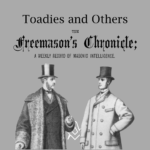 In the realm of Masonry, the principles of equality and respect are paramount. Yet, the presence of toadies—those who obsequiously seek favour from the influential—threatens these ideals. While Masonry embraces diverse beliefs and backgrounds, it rejects the sycophantic behaviours of toadies, flunkeys, and tuft-hunters, urging members to uphold genuine respect and self-worth. The Freemason's Chronicle - 22nd January 1876 |
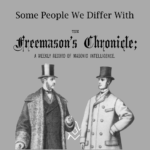 Unveiling the Unpleasant: Some People We Differ With Discover the intriguing dynamics of quarrels within the Masonic brotherhood. From the cantankerous to the litigious, the peevish to the vengeful, delve into the characters that challenge fraternal harmony. Explore their motives, temperaments, and the art of navigating disputes with these fascinating brethren. Brace yourself for a riveting journey into the world of conflicting personalities. |
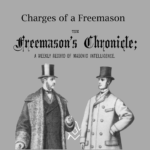 Unravelling the Masonic Mystique: A Deep Dive into the Freemasons' Charges - Explore the intricate world of Freemasonry, its principles, rituals, and the mechanisms for resolving internal disputes. Discover how this ancient fraternity fosters unity, promotes moral conduct, and upholds the sanctity of its secrets, while navigating the complexities of modern society. - The Freemason's Chronicle - 4 December 1875 |
 Unlock the hidden lessons of Masonic Studies! Don't settle for superficial knowledge or mere rituals. Discover the true depth and meaning behind Freemasonry. Expand your understanding of Tracing-Boards, Lectures, and more. Join regular Lodges of Instruction to enhance your Masonic journey. Become a knowledgeable Freemason, not just a token-bearer. Unleash the power of true Masonic wisdom today! |
 Uncover the incredible story of how Masonry saved the life of a Crimean War foot soldier in this historical and masonic account. Through the first hand experience of a soldier engaged in fierce hand-to-hand combat, witness the fateful encounter with a Russian Freemason that changed the course of his life. Learn how brotherhood and a deep dedication to the craft can lead to unforeseen and life-saving circumstances on the battlefield. |
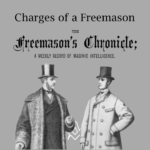 The Freemason's Chronicle - Charges of a Freemason The secrets of Masonry are the exclusive property of the Craft, and can never be communicated to one who is a mere labourer and not an accepted Mason. Hence, no labourer, that is, one who has not been regularly initiated in a legal Lodge. Article first published in The Freemason's Chronicle, 27 November 1875 |
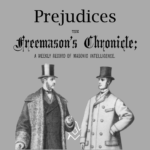 The Freemason's Chronicle - Prejudices Prejudices are partial judgments in favour of, or against certain persons or things, and, for convenience sake, may be ranged in two categories—those which are, comparatively speaking, harmless, and those which are harmful. Article first published in The Freemason's Chronicle, Oct. 2 1875. |
 The Freemason's Chronicle - Cliques Is Freemasonry - a Clique ? Man has been defined as a gregarious animal, but in his highly civilised condition he is gregarious only to a limited extent. First published in The Freemason's Chronicle, Oct. 2 1875, addresses the same challenges then as now. |
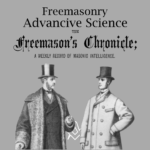 The Freemason's Chronicle - Freemasonry - an Advancive Science Is Freemasonry - an Advancive Science ? Not to confuse advancement with innovation. Has it been the case that Freemasonry's survival for 300 years plus is due to being an Advancive Science, tending to advance. First published in The Freemason's Chronicle 18 September 1875, addresses the same challenges then as now. |
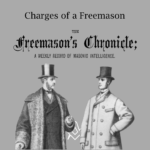 The Freemason's Chronicle - Charges Of A Freemason An interpretation of the "Charges of a Freemason", written Bro. Cornelius Moore and published in 1875, that introduce certain opinions that for some readers, will not sit well in contemporary times. - The Freemason's Chronicle, Sept. 11, 1875 |
 On The Order Of The Temple And Its Doctrine. THE Order of the Temple is divided into two great classes, denominated respectively the Order of the Temple and the Eastern Order. The Eastern Order gave birth to the Order of the Temple, and in the course of time has become an appendage of the latter. It is in ancient Egypt that we find the cradle of the Eastern Order. The Freemason's Chronicle, Sept. 4, 1875 |
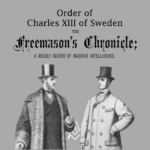 Order of Charles XIII of Sweden The following translation of the Manifesto of King JL Charles XIII of Sweden, on the occasion of his establishing the Masonic Order which bears his name, and of the Statutes of the said Order, may be interesting to our readers. The Freemason's Chronicle, Aug. 28, 1875 |
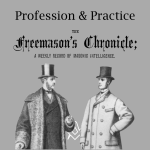 Most of our readers in the course of their experience, have doubtless met with enthusiastic brethren who take it for granted that a Mason can do no wrong. These enthusiasts are thoroughly convinced that the vast majority of those who join the Order are the most benevolent, the most moral, and the very noblest members of society. - The Freemason's Chronicle 10 July 1875 |
 An article investigating the relationship between masonry and citizenship. Are the principles of Freemasonry aligned with the freemason's claim to be a better citizen of the world? The Freemason's Chronicle - 19 June 1875 |
 A visitor must make clear his identity to the satisfaction of the Lodge he proposes to visit. More than once have we been asked to explain our views as to the reception of strangers in a Lodge. - The Freemason's Chronicle - 29 May 1875 |
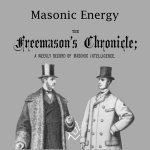 Is there reason in the accusation that Masonic energy looks only to a course of good feeds, when we can point to such grand results as have been achieved in these latter years, both in respect of the extension of our Order ? - 1May 1875 |
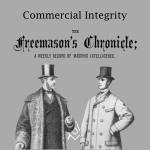 Implementing Freemasonry's peculiar system of morality in our day to day business affairs was the topic of this article, Commercial Integrity, first published in The Freemason's Chronicle - 8 May 1875 |
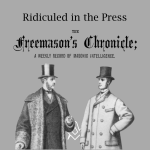 Ridicule has been somewhat illogically described as the test of truth. If it were so, Freemasonry ought to have perished long since. Two press reports from May 1875 covering the |
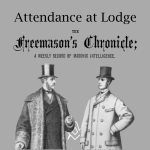 There are many things which Freemasonry will do for a man in the way of opening his mind and giving him larger and kindlier views of life, but Freemasonry itself, cannot eradicate the natural bias of the disposition. |
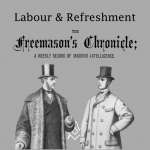 There is, we fear, too marked a tendency in very many Lodges to hasten through its labours, with a view to entering, as soon as possible, upon the business of refreshment. - The Freemason's Chronicle 17th April, 1875 |
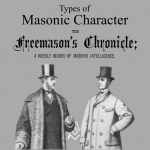 Another example that demonstrates that nothing really changes in Freemasonry. In an article the Types of Masonic Character published 145 years ago in The Freemason's Chronicle 10th April, 1875 |
 A brief history on the relationship between the British Monarchy and the craft - The Freemason's Chronicle 20th March , 1875 |
 What are the qualities of a convivial man and how does this dovetail perfectly in to Freemasonry ? 16th March, 1875 |
 A review of the "Sketch for the History of the Dionysian Artificers," a fragment, by Hyppoli to Joseph Da Costa - This little work may be regarded as, so to speak, the Holy Grail of Masonry. |
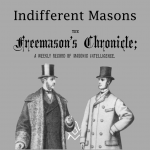 Nothing really changes, an article Indifferent Masons, From Le Monde Maçonnique 1874. Translation published in The Freemason's Chronicle 20th February, 1875 |
 In handling an intruder in the lodge, we endeavoured to show that a good Mason should be a gentleman, and a sincere man. The Freemason's Chronicle 20th February, 1875 |
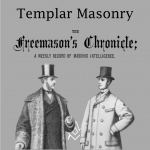 Templar Masonry - a historical aspect of the Religious and Military Order of the Temple published in The Freemason's Chronicle 13th February, 1875 |
 Secrecy perhaps the strongest objection urged by the enemies of the Masonic Order against its existence published in The Freemason's Chronicle 20th March 1875 |
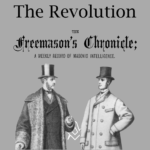 Freemasonry In The United States during And After The Revolution We take a look at Freemasonry in the United States during and after the Revolution first published in The Freemason's Chronicle - February 6, 1875 |
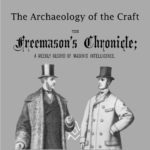 We take a look at the archaeological connection with the Craft, first published in The Freemason's Chronicle - January 30, 1875 |
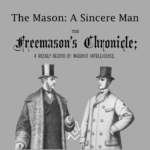 What it means to a Freemason to be a sincere man. Extract: first published in The Freemason's Chronicle - January 23, 1875 |
 What it means to a Freemason to be a citizen of the world ? First published in The Freemason's Chronicle - January 16, 1875 |
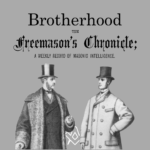 Brotherhood! In that one word what sympathetic associations arise. First published in The Freemason's Chronicle - January 9, 1875 |
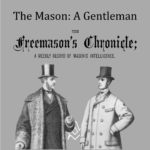 This opening article was written 145 years ago, yet it resonates with Freemasons today as it did then. First published in The Freemason's Chronicle, January 2, 1875, Issue 1 |
masonic knowledge
to be a better citizen of the world
share the square with two brothers

click image to open email app on mobile device








